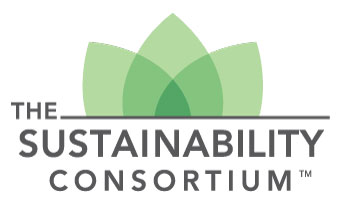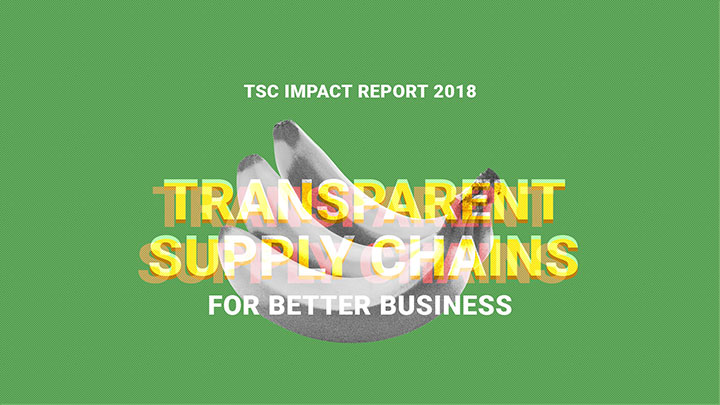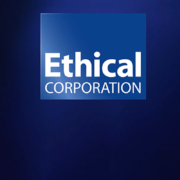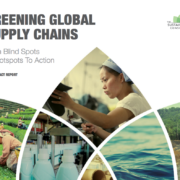The Sustainability Consortium’s 2018 Impact Report Shows Rapid Year-Over-Year Improvements for Suppliers Committed to Measuring Transparency in Their Supply Chains

“Transparent Supply Chains for Better Business” shows a sharp increase in transparency by suppliers answering TSC KPIs as a part of The Sustainability Index
July 19, 2018, Scottsdale, AZ – The Sustainability Consortium (TSC) released its 2018 Impact Report, “Transparent Supply Chains for Better Business”, online today showcasing year-over-year trends in sustainability reporting based on the key performance indicators (KPIs) that drive The Sustainability Index primarily used by Walmart and Sam’s Club. The 2018 Impact Report is presented fully online with case studies to be published throughout the rest of the year.
TSC’s latest report shows that suppliers are improving the transparency of their supply chains and creating better business practices. Learning what is needed to answer the Index leads to rapid improvement from suppliers in their systems. In 2017, 1,683 suppliers reported to the Index. In 2016, these suppliers represent over $200 billion in retail sales.
Comparing data from 2016 to 2017, TSC shows that fewer organizations chose the KPI response “Unable to determine at this time”. The average supplier scores increased by 3%, from 33% to 36%. The number of individual KPI scores between 0 and 10% has decreased from 50% to 48% from 2015 to 2017. The number of KPI scores between 90 and 100% has increased from 22% to 26% from 2015 to 2017.

Changes in Sustainability Index Scores. The Sustainability Consortium | ©2018 Arizona State University and University of Arkansas
For the majority of suppliers who are not scoring in the upper ranges, the best way to improve their score is to improve the transparency of their supply chain. Suppliers who participated in TSC’s training were asked if they had done anything in the past year to improve their Sustainability Index score, and 88% answered yes, with over half of those suppliers saying that they had engaged their own suppliers around sustainability performance and relevant data.

Taking Action to Improve Sustainability Index Scores. The Sustainability Consortium | ©2018 Arizona State University and University of Arkansas
Consumers and investors are increasing their demands for transparency in the consumer products they buy, asking the questions – how is it made, where is it made, what is it made of, and how do I properly use and dispose of it? Organizations that are more transparent with the answers to these questions have more consumer and investor trust, which leads to loyalty and positive business value.
TSC Chief Executive Euan Murray states, “In 2017, we saw an unprecedented increase in the implementation of our work, and we saw more companies commit to improve their performance. This is a clear response to the demand signal from retailers, brands and other major purchasers to improve supply chain transparency, understand sustainability impacts and take action to improve. It’s also a positive response to growing consumer demands, and another endorsement of the idea that sustainability is good for business.”
TSC’s Impact Report also shows that the highest-scoring companies are those that have been working on sustainability the longest. That group has the highest scores, the biggest improvements and the best track-record in transparency and sustainability. It also means there’s a clear path for all other companies to follow. The data shows that suppliers who:
- Only reported to the Index in 2017 scored on average a 36.4
- Reported to the Index in 2016 and 2017 scored on average a 40.7
- Reported to the Index in 2015, 2016, and 2017 scored on average a 46.8.
Dr. Kevin Dooley, TSC Chief Scientist, says, “The year-to-year comparisons suggest that most companies are to be able to improve their transparency over a period of one to two years. From our experience in working with suppliers, increases in scores have occurred in part because brand manufacturers have improved the systems to increase transparency into what is happening in their factories and supply chains. This is all positive evidence that increasing transparency is happening as a measured outcome.”
“Over the last three years, Spectrum Brands has worked to improve our scores on The Sustainability Index, powered by TSC. We saw our scores improve, directly leading to new business efficiencies. We joined TSC not only to support the great work the organization puts out to help companies like ours improve sustainability efforts and become more efficient, but also to take action on the major issues we face in sustainability today,” states Dan Hutter, DVP and Chief Sustainability Officer, Spectrum Brands, Inc.
In 2016, TSC published their very first Impact Report called “Greening the Global Supply Chains: From Blind Spots to Hotspots to Action”. The report covered both the benefit and the environmental cost of producing consumer goods for a growing population. In 2017, TSC published “The Call for Collective Action Across Supply Chains”. The report provided evidence that the act of integrating sustainability into every decision and process in supply chains helps companies avoid risks to their bottom lines. The full 2018 Impact Report can be found here: www.sustainabilityconsortium.org/impact-report/. Additional retail members of TSC include Kroger, Walgreens, Amazon and Marks & Spencer.
About TSC
The Sustainability Consortium (TSC) is a global organization transforming the consumer goods industry to deliver more sustainable consumer products. We are dedicated to improving the sustainability of consumer products. Our members and partners include manufacturers, retailers, suppliers, service providers, NGOs, civil society organizations, governmental agencies and academics. Each member brings valuable perspectives and expertise. TSC convenes our diverse stakeholders to work collaboratively to build science-based decision tools and solutions that address sustainability issues that are materially important throughout a product’s supply chain and lifecycle. TSC also offers a portfolio of services to help drive effective implementation. The Sustainability Consortium has more than 100 members and there are over 2,000 users of TSC tools worldwide; it convenes more than 200 global organizations annually over an average of 75 networking opportunities. Formed in 2009, TSC is jointly administered by Arizona State University and the University of Arkansas. It also has a European office at Wageningen University and Research, and a Chinese office in Tianjin, China. For more information visit www.sustainabilityconsortium.org.
Press Inquiries
Erika Ferrin
Sr. Director of Marketing, Communication and Development
The Sustainability Consortium
(480) 965-7752
erika.ferrin@sustainabilityconsortium.org

 ©2018 Arizona State University and University of Arkansas
©2018 Arizona State University and University of Arkansas






